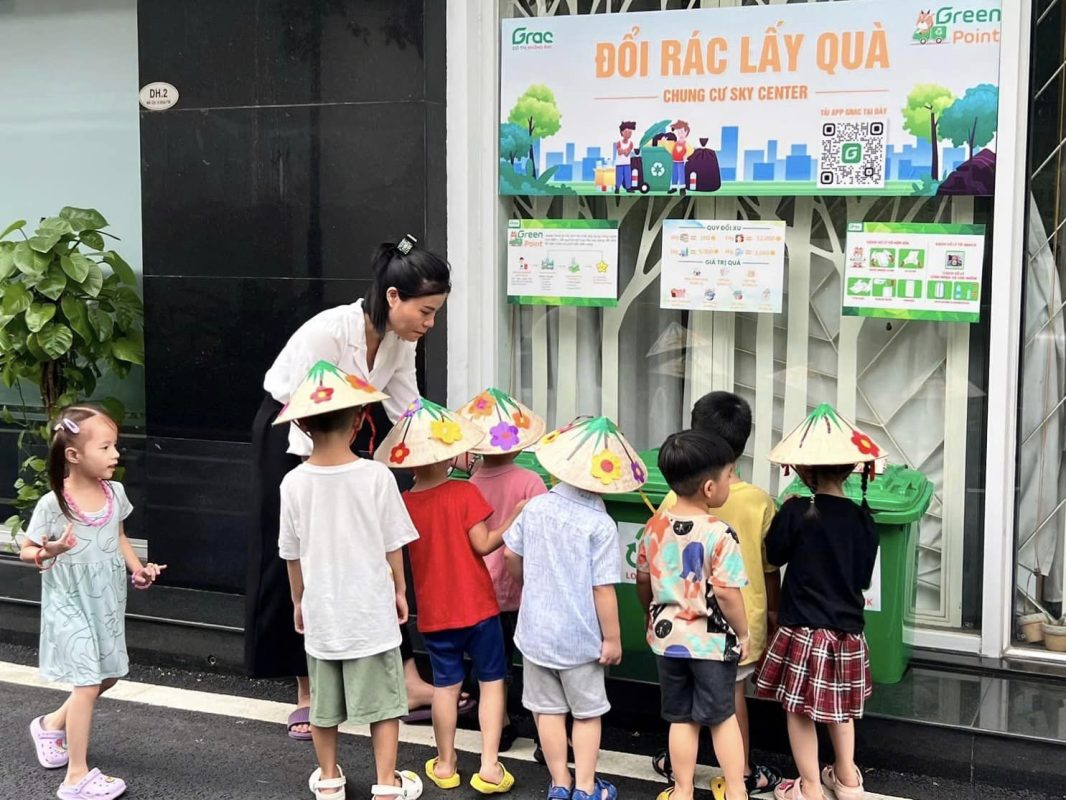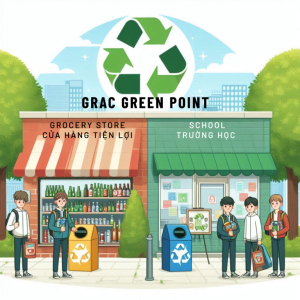Every apartment, residential area and school is a green recycling spot

Each apartment, residential area and school is a Green Point recycling green point and complies with the regulations on waste classification at source of the Law on Environmental Protection 2020 before January 1, 2025.
The idea that each apartment, residential area and school is a green recycling point can bring many benefits in waste collection and recycling. By building recycling collection points in these places, it is possible to achieve:
- Increase community awareness: Help residents and students better understand the importance of recycling and environmental protection.
- Convenience in collection: Collection points located right on the spot make the collection of recyclable waste easier and more effective.
- Reduce waste: Encourage waste classification at source, reduce the amount of waste sent to landfill.
- Reduce costs: Collecting and processing recyclable waste on the spot can reduce transportation and processing costs.
- Create a source of recycled resources: Collected materials can be recycled and reused, reducing the need for new resources.
Become a Grac Green Point partner
FAQs about GREEN POINT
In the world, many places have successfully applied the model of waste collection and recycling in apartments and schools, bringing positive results. Here are some examples:
– Japan is famous for its strict waste classification and recycling system. Apartments and residential areas all have separate recycling collection areas. Schools also educate students about the importance of recycling.
– Sweden has an advanced recycling system with recycling collection points in many residential areas and schools. Sweden also has mobile recycling stations and collection points for sorted recycling waste in apartments.
– Korea applies the model of waste separation at source with separate collection areas in apartments and schools. Strict waste sorting systems help increase recycling rates and reduce the amount of waste sent to landfills.
– Many European countries such as Germany, the Netherlands, and Austria have also implemented recycling collection systems in apartments and schools. These countries have clear education programs and waste sorting systems, which help increase recycling awareness and efficiency.
– The United States also has many recycling programs in schools and residential areas. For example, in San Francisco, the city has implemented recycling and waste sorting programs in apartments and schools, helping to reduce the amount of waste sent to landfills.
These models have all shown high efficiency in increasing recycling, reducing waste, and raising public awareness of environmental protection. Grac Tech learns from these successful models to apply in Vietnam, suitable for local conditions and needs.
Characteristics of residential areas, apartments, and schools as Green Point recycling green points:
- Integrated diverse utilities: Residential areas and apartments often combine many types such as apartments, villas, schools, hospitals, shopping centers, and parks. This helps residents to be convenient in their daily activities and minimize long-distance travel to use recycling services.
- Diversity in scale: Residential areas can be small, consisting of only a few dozen households, or large, with hundreds of households. Therefore, they themselves issue regulations to manage recycling areas according to the characteristics of each place.
- Subject to the direction of local authorities on waste management and waste classification: Residential areas must comply with the legal policies of the Party and State, and at the same time respond to the control of local authorities.
Regarding the consideration of recycling areas, this is an important part of building a sustainable living environment. Residential areas and schools can play an important role in creating a modern recycling model and minimizing waste.
Classification of domestic solid waste (MSW) according to the Law on Environmental Protection 2020:
- Solid waste with the ability to be reused and recycled: This is the type of waste that we can reuse or recycle to minimize the impact on the environment. For example, materials such as paper, plastic, and metal can be recycled to produce new products.
- Food waste: This is food waste, including leftovers, fruit peels, seed shells, and inedible parts. Food waste can be used as organic fertilizer or animal feed.
- Other MSW: This is domestic solid waste that does not fall into the above two categories. For example, broken fluorescent lamps, batteries, gas cylinders, plastic packaging, and other items.
For urban households and individuals, after sorting, we need to put CTRSH into separate packaging according to each type and transfer it to organizations or individuals with corresponding functions. As for rural households and individuals, we should encourage the use of food waste to make organic fertilizer or animal feed.
Waste classification at the source plays an important role in reducing waste treatment costs and protecting the environment.
REASONS TO COOPERATE WITH GRAC
Grac has used technology to revolutionize waste management and recycling in Vietnam, making the recycling collection model more efficient, cost-effective and environmentally friendly.
- Mobile application: Grac provides a mobile application that helps people sort waste at the source. Users can earn reward points when participating in this process. The Grac app is available on Google Play and the App Store.
- Reward points system: Reward points can be exchanged for products, services or cash from Grac’s partners.
- Grac Green Point Network: Grac has built a network of recyclable waste collection points nationwide. Waste after being classified and collected at these points will be transferred to the nearest scrap yards.
- SaaS: Grac provides SaaS software solutions for People’s Committees at all levels and household waste collection companies. Grac supports the digitalization of more than 1 million waste source owners (including households and non-households). Grac connects with Momo and Payoo to be able to collect and pay for waste from more than 34 banks, e-wallets, convenience stores, etc.
- Smart cities: Grac pushes data through local smart operation centers (IOC Centers) to promote digital transformation activities and the Government’s cashless policy.
- Grac Education: a learning and testing platform for those who love the environment, waste sorting, climate change, plastic waste reduction, etc.
By using technology, Grac has helped transform waste management and recycling, saving time and costs, supporting the circular economy, helping to reduce, reuse and recycle waste. Grac is committed to making a difference in the world by transforming waste management, encouraging recycling and promoting sustainability.


